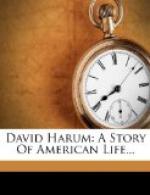“Well,” said John, laughing, “you could have done what I was lucky enough to do with the horses, but—”
“Yes, yes,” David broke in, scratching his cheek, “I guess you got me that time.”
Mr. Euston perceived that for some reason he had an ally and advocate in Mr. Harum. He rose and said good-night, and John escorted him downstairs to the door. “Pray think of it as favorably as you can,” he said, as they shook hands at parting.
“Putty nice kind of a man,” remarked David when John came back; “putty nice kind of a man. ’Bout the only ’quaintance you’ve made of his kind, ain’t he? Wa’al, he’s all right fur ’s he goes. Comes of good stock, I’m told, an’ looks it. Runs a good deal to emptins in his preachin’ though, they say. How do you find him?”
“I think I enjoy his conversation more than his sermons,” admitted John with a smile.
“Less of it at times, ain’t the’?” suggested David. “I may have told ye,” he continued, “that I wa’n’t a very reg’lar churchgoer, but I’ve ben more or less in my time, an’ when I did listen to the sermon all through, it gen’ally seemed to me that if the preacher ‘d put all the’ really was in it together he wouldn’t need to have took only ’bout quarter the time; but what with scorin’ fer a start, an’ laggin’ on the back stretch, an’ ev’ry now an’ then breakin’ to a stan’still, I gen’ally wanted to come down out o’ the stand before the race was over. The’s a good many fast quarter hosses,” remarked Mr. Harum, “but them that c’n keep it up fer a full mile is scurce. What you goin’ to do about the music bus’nis, or hain’t ye made up your mind yet?” he asked, changing the subject.
“I like Mr. Euston,” said John, “and he seems very much in earnest about this matter; but I am not sure,” he added thoughtfully, “that I can do what he wants, and I must say that I am very reluctant to undertake it; still, I don’t know but that I ought to make the trial,” and he looked up at David.
“I guess I would if I was you,” said the latter. “It can’t do ye no harm, an’ it may do ye some good. The fact is,” he continued, “that you ain’t out o’ danger of runnin’ in a rut. It would do you good mebbe to git more acquainted, an’ mebbe this’ll be the start on’t.”
“With a little team of half a dozen women, as you called them,” said John. “Mr. Euston has offered to introduce me to any one I cared to know.”
“I didn’t mean the singin’ folks,” responded Mr. Harum, “I meant the church folks in gen’ral, an’ it’ll come ’round in a natur’l sort of way—not like bein’ took ’round by Mr. Euston as if you’d ast him to. You can’t git along—you may, an’ have fer a spell, but not alwus—with nobody to visit with but me an’ Polly an’ Dick, an’ so on, an’ once in a while with the parson; you ben used to somethin’ diff’rent, an’ while I ain’t sayin’ that Homeville soci’ty, pertic’lerly in the winter, ’s the finest in the land, or that me an’ Polly




